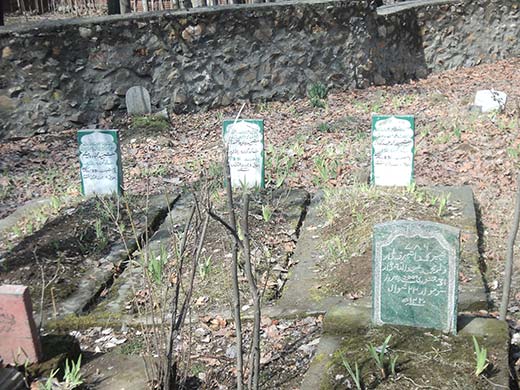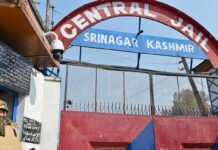Fourteen years have passed since four members of Sajja’s family were gunned down by unidentified men. Who killed them and why, are some of the questions Sajja seeks answer to. Riyaz Ul Khaliq reports
 On the intervening night of August 31st and September 1st 2001 in restive Garoora village in North Kashmir’s Bandipora district, Muhammad Abdullah Dar, a truck driver with State’s Forest Corporation, and his family was about to retire for the night when a loud knocking on the door pierced through the silent night.
On the intervening night of August 31st and September 1st 2001 in restive Garoora village in North Kashmir’s Bandipora district, Muhammad Abdullah Dar, a truck driver with State’s Forest Corporation, and his family was about to retire for the night when a loud knocking on the door pierced through the silent night.
It was just past midnight and children in Dar’s family were already asleep. There were around seven men, all heavily armed, who made their way inside the house one after another. They told Dar that they want some food and water.
As Dar’s family started making arrangements for the ‘guests’ something unexpected happened. The guests took out their automatic weapons and started firing in all directions. Before Dar could have reacted or realized what is happening, his wife Saaja and daughter-in-law Mehmooda were lying on the floor in a pool of blood. It happened so quickly that nobody in the Dar’s house could move a muscle or react. After the guns fell silent there were just shrieks and cries all around.
But that was not the end of nightmare for Dar who stood there shell shocked looking at two women of his house withering in pain and blood.
The men with arms then dragged Dar and his youngest son Javaid Ahmad Dar, 19, a 12th standard student, out in the courtyard and started interrogating them.
“They accused my husband of collaborating with government forces to get militants killed,” said Saaja, who survived the night after she was helped by the locals.
While Saaja and her daughter-in-law were sinking of their injuries, there were loud voices coming from the courtyard.
The men with arms were shouting at Dar and his son and telling them that they had informed government forces about the presence of two militants in their house a few months back. Both the militants were killed after government forces stormed Dar’s house and razed it to ground after a fierce gun battle.
“My husband and son denied all the charges but they did not believe them,” says Saaja. Then all of a sudden Saaja and Mehmooda, who were still inside the house trying to cover their wounds by every possible means, heard more gunshots.
“Despite being injured herself Mehmooda tried to rush outside after hearing gunshots but collapsed near the main door and died. She was hit in the heart,” recalls Saaja. Mehmooda’s husband and Saaja’s eldest son Muhammad Ashraf Dar, who worked in state’s Horticulture department, was killed by some unidentified gunmen outside his house in 2000. Mehmooda has three daughters, Ishrat, Tabu and Bulbul.
“Mehmooda’s kids hid under a tin sheet and stayed there till neighbours came to help us. They were now completely orphaned as their mother’s body lay near the main door,” says Saaja.
Both Dar and his son Javaid were shot dead by the gunmen. Saaja, who was shot in both the legs, could not move out to check what has happened. She fainted. Dar and Javaid’s bodies remained outside in the courtyard unattended for around 3 hours.
At around 3 AM, Dar’s brother, who lives next door, along with some neighbours came out, to help. “I guess he (Dar’s brother) was afraid to come out as they (gunmen) would have killed him too,” says Saaja.
A junior medical assistant, who lived in the vicinity attended Saaja hoping to stop the bleeding, but the wounds were too deep. It was only in the morning that Saaja was shifted to district hospital Bandipora.
For Saaja the events of the night which left three members of her family dead, were replica of what had happened two months back.
“Two youngsters came to our house some two months back to seek refuge. The next morning Army from Argam and Nadihal camps cordoned the village and blasted our three story house. I don’t know what happened to the two militants?” says Saaja.
But locals have a different version to Saaja’s story of the incident. “Both the militants were killed inside Saaja’s house while fighting. Army blasted the house to kill them,” says a local resident who wished not to be named.
“Those who killed my husband, youngest son and my daughter-in-law claimed to be friends of two youngsters killed that day when our house was blasted,” says Saaja.
“I don’t even know why and who killed my eldest son Ashraf?” says Saaja.
But locals claim that Saaja’s eldest son and Mehmooda’s husband was a renegade working for government, which family refutes. “He was killed because of his links with Ikhwaan,” says a local who refuses to be named.
With four deaths happening in Saaja’s family within a year’s time, there are no male members left in the once lively Dar household.
Saaja now lives with her eldest son Ashraf’s three daughters.
Interestingly, Saaja’s husband was suspended from his services for ferrying timber from Kupwara forests ‘illegally’ during 90s. He challenged the suspension but lost the case as he could not produce his employment order.















